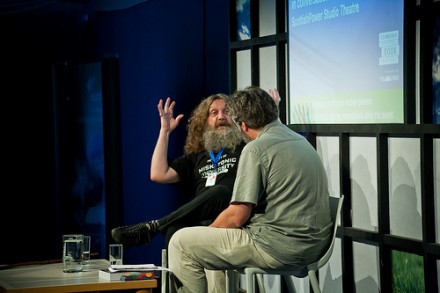Alan Moore is many things, but scary is not one of them. From my massive nerdery over the years, I have seen a couple of comic book writers talk about their work and there is one thing they always say; Alan Moore is a scary scary genius of a man. Neil Gaiman is nervous of him. Warren Ellis wouldn’t take him in a fight. Even Mark Millar speaks about him with hushed tones.
However, this is not the Moore I saw today. Sure, he has an excellent beard, and yes, he is frighteningly intelligent, but at his core Alan Moore comes across as a very rational and personable man.
His work in comics helped redefine the genre at a time when it needed it most, helping, in his own words, to make comics fit their times and more accurately reflect a contemporary world. Almost 30 years on, and Moore speaks of his comic work with only a hint of regret, and apologises for starting the trend that has made every character in today’s comics a psychopath or a murderer. Sadly, he does not hold the rights for the most famous of these books (Swamp Thing, Watchmen, V for Vendetta), due to creators’ rights issues. Moore has now become known for his work outside the mainstream, with smaller publishers like Knockabout and America’s Best Comics. For people looking for something off the beaten track, I can now recommend Moore’s new magazine venture, Dodgemlogic.
During the space of a too short hour, Moore talked about his background, his methods of storytelling (Moore is famous for his highly visual scripts) and his past with DC. He speaks with such confidence and resolution about this time, that you can’t not see his side of the story.
At the end of the event, an audience member asks; ‘Alan, how do you not compromise your morals and stay true to your writing, while still making your books a huge commercial success?’ to which Alan Moore responds:
‘As a writer, you simply cannot think about commercial success. You have the obligation to stay true to your own voice, but that is all. At the end of the day, it doesn’t matter what people want, because they’d probably want The Sun; it’s about what they need.’















Comments